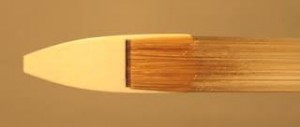If You’re Traveling Abroad With Your Instrument This Summer, You Need to Read This
 By now, most of us have heard something about the Obama administration’s ban on commercial trade in elephant ivory, but its direct implications for musicians traveling internationally have been continuously changing, and somewhat overwhelming to decipher. As a result, a lot of discourse on the matter might have fallen under the “tl;dr” (too long, didn’t read) category for a lot of students, especially those who aren’t planning to leave the country anytime soon. However, obtaining the necessary documentation to prove your instrument’s compliance with the legislation can be a prolonged process, and regardless of your current travel prospects, it is important that you have a working knowledge of the situation. So, I’m devoting this week’s post to a brief overview of the essentials that (I hope) will not fall under the tl;dr category.
By now, most of us have heard something about the Obama administration’s ban on commercial trade in elephant ivory, but its direct implications for musicians traveling internationally have been continuously changing, and somewhat overwhelming to decipher. As a result, a lot of discourse on the matter might have fallen under the “tl;dr” (too long, didn’t read) category for a lot of students, especially those who aren’t planning to leave the country anytime soon. However, obtaining the necessary documentation to prove your instrument’s compliance with the legislation can be a prolonged process, and regardless of your current travel prospects, it is important that you have a working knowledge of the situation. So, I’m devoting this week’s post to a brief overview of the essentials that (I hope) will not fall under the tl;dr category.
Essential #1: Why There is an Ivory Ban
Basically, some poachers in Africa were up to no good. In October 2013, the public learned that these guys in Zimbabwe used cyanide to poison a water hole in the country’s largest game reserve, Hwange National Park, senselessly killing a large number of elephants and other safari animals. Elephant tusks are still worth a significant sum on the black market, so poachers such as the ones in this instance continue to instigate mass killings. Understandably, the news was met with umbrage by the general public, so this past February, officials in the Obama administration banned commercial trade in elephant ivory.
Essential #2: How it Effects Traveling Musicians
For the first few months of the law’s implementation, there was a lot of confusion surrounding policies for musical instruments, but as of May 15th, the process is now clarified. Musical instruments containing “worked” elephant ivory CAN be brought into the country (phew!) provided that:
a) they were legally acquired before February 26, 1976 (not necessarily by you, just by whoever owned it previously)
b) they were not “transferred from one person to another person for financial gain or profit” since February 25, 2014
c) you qualify for a fancy document called a “CITES musical instrument certificate”, and…
d) you have a “CITES musical instrument certificate.”
Essential #3: What You Need to Do
Apply for a CITES musical instrument certificate! This may take a lot of time, so if you’re planning to travel abroad at any point during the summer, now is the time to get on top of this. This is especially important if you have bought an instrument since March 25th, as you will need to prove to the folks at customs that your instrument contains ivory that was legally acquired prior to February 26, 1976. The League of American Orchestras website has a great page containing all the pertinent information about the process; check it out here.
Additionally, I would strongly recommend reading Richard Levine’s highly informative article on the matter in the May 2014 edition of “Senza Sordino” (viewable online HERE. The article begins on page 7).
Finally, spread the word amongst your fellow students. Traveling with instruments is never an easy endeavor, but complications from these new restrictions could very well put an unwanted end to your itinerary. Ensuring that everyone is knowledgeable of the situation will greatly aid in preventing such complications, and assure a smooth travel process for everybody.


They mean business–at least in New York.
http://slippedisc.com/2014/06/exclusive-new-york-customs-hold-orchestra-to-ransom/